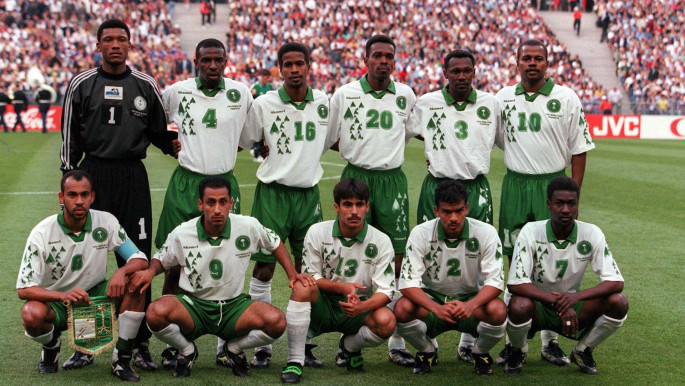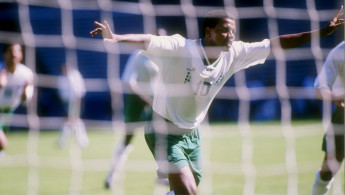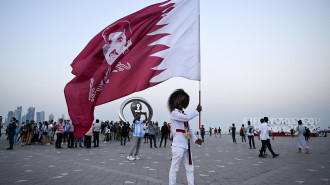Saeed al-Owairan and Saudi football's most famous goal
Football fans love to talk about "golden generations", and nostalgically remember those teams from bygone eras where confidence was high and a nation believed.
Sometimes that elite group of players goes the distance, reaching a final and lifting a trophy - but sometimes their exploits are not defined simply by the colour of the medals they receive.
For the 1994 Saudi Arabian national team, it would be a single goal that would help ensure their place in FIFA World Cup history.
Picking up the ball deep in his own half, midfielder Saeed al-Owairan put on a burst of pace that took him through a gap between two Belgian players, just beyond the halfway line.
Though he seemed to have lost control of the ball for a moment, it somehow stayed glued to his feet as the number 10 skipped around Michel De Wolf and in to the penalty area.
Al-Owairan moved past defender Rudi Smidts and, in a tangle of bodies, and moments before falling, placed the ball high beyond Michel Preud'homme in the back of the Belgian goal.
Just five minutes in,
 |
|
| Saudi Arabia's France'98 team: (top row) Torwart Mohammed al-Deayer, Abdullah Zubromawi, Khamis al-Owairan, Hamzah Saleh, Mohammed al-Khilawi, Saeed al-Owairan (front row) Fuad Amin, Sami al-Jaber, Hussein Sulimani, Mohammed al-Janahi, Ibrahim al-Shahrani [Getty] |
A new era
Repeated viewings of the goal, which highlight some fairly lax Belgian defending, have perhaps been slightly unkind to al-Owairan; after all, the performances of that Saudi Arabian team in 1994 remain their best in the World Cup to date.
They led against the
For al-Owairan, it was the zenith of a career that saw him score 24 goals for the national team - and more than 200 for Al-Shabab. In 1994 he was named Asian Footballer of the Year, but his Saudi teammates, including Sami al-Jaber and Fuad Anwar, had been every bit as much a part of their country's success in America.
A World Cup wouldn't be complete without unexpected outsiders playing free-flowing and counter-attacking football, and the 1994 Saudi Arabian team delivered just that. Football in the
Inevitably, golden generations have a limited lifespan; al-Owairan had well-documented legal troubles and, though he featured at the 1998 World Cup, his appearances were brief. There were echoes of Roger Milla, the
Legacy
Yet
In the 82nd minute al-Jaber was brought on and, just two minutes later, looked to have won Saudi Arabia their first World Cup finals match for twelve years - until an injury-time Tunisian equaliser secured a 2-2 draw for the north Africans.
It was only
Al-Jaber and al-Deayea made their final appearances for the national teams in 2006, and with them the last of the golden generation retired. And what of their legacy? It's too easy, and too simple, to ignore everything else they achieved - winning the 1996 Asian Cup, for example - at the expense of that one dazzling goal against
For a time, football lovers the world over knew the name Saeed al-Owairan.
Saudi fans will be very aware that 2022 will see the first-ever World Cup on Middle Eastern soil, and the chance for new talent to create their own legacy.
It is, perhaps, the perfect time for a new golden generation to emerge.
Olly Hogben is a freelance sports commentator, presenter and writer.
Follow him on Twitter: @bennettcomms



